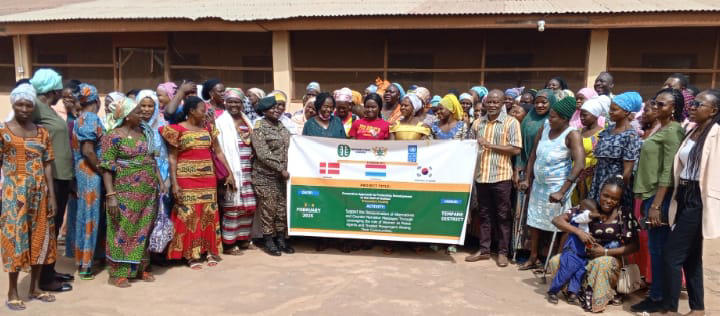The National Peace Council has organised a two-day capacity-building workshop in Tempane to equip women traders and border security officers to enhance cross-border security, combat trafficking, and curb small arms proliferation.
A total of 48 participants drawn from Basyondy, Warinyanga, and Dintilga markets and the various security services were taken through the impact of organised crimes on community security, the role of women traders in preventing trafficking, strategies for cross-border cooperation, among others.
The training, held on the theme: “Strengthening Border Security and Peacebuilding Mechanisms through Capacity Building for Women Traders, Local Peace Institutions and Border Managers in the Tempane District”, aimed to foster collaboration in tackling cross-border crime.
It formed part of the Prevention Facility of the Gulf of Guinea Project with funding support from Japan through the United Nations Development Programme (UNDP).
Mr Damien A. Asobayire, the Upper East Regional Executive Secretary of the National Peace Council, addressing the participants, said the vulnerabilities of border communities like Tempane were being worsened by illicit trafficking, weak border management systems, and limited gender-sensitive peacebuilding approaches.
He emphasised that women traders, who play a critical role in cross-border economic activity, were underrepresented in border security and peacebuilding processes despite being key to community resilience.
“Women, engaged in cross-border trade, face unique challenges and it is important that their capabilities are built to well position them so that their voices and experiences can inform our security and peacebuilding efforts,” he stated.
Mr Asobayire added that the training would not only help women traders and border officers to work together more effectively but also strengthen networks for ongoing collaboration, information sharing, and early intervention against criminal activities.
“Illicit trafficking and small arms proliferation threaten peace and security, and by enhancing cooperation between women traders, peace committees, and border officials, we are building a united front to protect our communities,” he added.
He said the workshop was expected to lead to the establishment of stronger community-based early warning and response mechanisms, greater involvement of women in preventing trafficking, and improved coordination between civilian and security actors in the district.
Mr Victor Akanbonga, the Regional Programmes Officer of the National Commission on Small Arms and Light Weapons, presenting a paper on the topic “Illicit Trafficking and Small Arms Proliferation,” underscored the need for the public to follow due processes in acquiring arms.
According to him, the possession of illegal firearms was against the laws of the country, and one could face a fine of up to GH¢12,000.00 or lifelong imprisonment with a minimum sentence of 10 years, depending on the gravity of the crime.
He said the circulation of illegal weapons remained a major driver of insecurity not only in border communities but also added to the pool of unregulated arms that fuelled violence and organised crime, and urged the participants to report persons in possession of illegal arms for their own safety.
Mr Joseph Mbabila Ayaaba, the Tempane District Chief Executive (DCE), thanked the Peace Council and its partners for spearheading peacebuilding in the area to create an enabling environment to improve economic activities and advance development, and charged the participants to extend the knowledge gained to the larger community.
GNA





